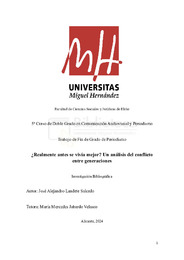Please use this identifier to cite or link to this item:
https://hdl.handle.net/11000/33349Full metadata record
| DC Field | Value | Language |
|---|---|---|
| dc.contributor.advisor | Jabardo Velasco, María Mercedes | - |
| dc.contributor.author | Landete Salcedo, José Alejandro | - |
| dc.contributor.other | Departamentos de la UMH::Ciencias Sociales y Humanas | es_ES |
| dc.date.accessioned | 2024-10-01T12:52:50Z | - |
| dc.date.available | 2024-10-01T12:52:50Z | - |
| dc.date.created | 2024-06 | - |
| dc.identifier.uri | https://hdl.handle.net/11000/33349 | - |
| dc.description.abstract | En este trabajo fin de grado se aborda la brecha generacional que se ha abierto entre las Generaciones Baby Boomer y X y las Generaciones de nómadas digitales (Y, Z: Millennials), y que cierto segmento de esta última ha traducido en la frase “vivimos peor que nuestros padres”. Se analizarán las condiciones sociopolíticas tanto de la generación pasada como de la actual, presentando de forma independiente y profunda cada generación e intentando entrecruzarlas para entender ambos puntos de vista del conflicto generacional que se está produciendo en la actualidad, tanto de forma directa como indirecta. Esta aproximación tendrá una doble dimensión –cuantitativa y cualitativa- combinando datos de carácter estadístico con historias de vida y/o descripciones experienciales de representantes de cada una de las generaciones. Las preguntas que guiarán este trabajo son las que rondan las cabezas de los jóvenes actuales, sobre los que alguna vez fueron jóvenes y ahora parecen impedir que ellos lo sean. Y si realmente aquellos jóvenes de los noventa tuvieron también tiempos duros, ¿realmente hubo una generación que vivió mejor? | es_ES |
| dc.description.abstract | This final degree project addresses the generational gap that has opened between the Baby Boomer and X Generations and the Digital Nomad Generations (Y, Z: Millennials), and that a certain segment of the latter has translated into the phrase “we live worse than our parents.” The sociopolitical conditions of both the past and current generations will be analyzed, presenting each generation independently and in depth and trying to intertwine them to understand both points of view of the generational conflict that is currently occurring, both directly and indirectly. This approach will have a double dimension – quantitative and qualitative – combining statistical data with life stories and/or experiential descriptions of representatives of each of the generations. The questions that will guide this work are those that haunt the heads of today’s youth, about those who were once young and now seem to prevent them from being so. And if those young people of the nineties really also had hard times, was there really a generation that lived better? | es_ES |
| dc.format | application/pdf | es_ES |
| dc.format.extent | 43 | es_ES |
| dc.language.iso | spa | es_ES |
| dc.publisher | Universidad Miguel Hernández de Elche | es_ES |
| dc.rights | info:eu-repo/semantics/openAccess | es_ES |
| dc.rights | Attribution-NonCommercial-NoDerivatives 4.0 Internacional | * |
| dc.rights.uri | http://creativecommons.org/licenses/by-nc-nd/4.0/ | * |
| dc.subject | Generaciones | es_ES |
| dc.subject | Brecha Generacional | es_ES |
| dc.subject | Vivienda | es_ES |
| dc.subject | Trabajo | es_ES |
| dc.subject | Internet | es_ES |
| dc.subject | Generations | es_ES |
| dc.subject | Generational Gap | es_ES |
| dc.subject | Apartament | es_ES |
| dc.subject | Job | es_ES |
| dc.subject | Intern | es_ES |
| dc.subject.other | CDU::0 - Generalidades.::070 - Periódicos. Prensa. Periodismo. Ciencias de la información | es_ES |
| dc.title | ¿Realmente antes se vivía mejor? Un análisis del conflicto entre generaciones | es_ES |
| dc.type | info:eu-repo/semantics/bachelorThesis | es_ES |

View/Open:
PER_TFG_LANDETE_SALCEDO_JOSÉALEJANDRO.pdf
1,48 MB
Adobe PDF
Share:
.png)
